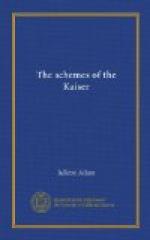During these past few days, in the Vienna Parliament, whilst an orator on the Government side was singing the praises of the Emperor Francis Joseph, a German Austrian exclaimed—an Austrian, mark you—“Our Emperor is William II.”
The credulous fools of the moment in France are the Socialists. Just as we believed in the liberalism of German Liberals before 1870, so French Socialists now believe in the internationalism of German Socialists. With greater sincerity than anything displayed by the old German Liberals of before 1870, the Socialists of Hamburg have taken the trouble to enlighten their French brethren with regard to their real sentiments. Herr Liebknecht himself has explained their attitude; his words may be summed up as follows: “The Socialists of France are our brothers, but if they wanted to take back Alsace-Lorraine, we should regard them as enemies.”
There is nothing more remarkable than these German Socialists and their congresses, these fellows who always preach to other nations against patriotism, and never come together except to make speeches about the Fatherland. At the Hamburg Congress, Auer, the socialist deputy, looked into the future and saw “the Cossacks trampling underfoot all the liberties of Western Europe.” What tyranny of barbarians could be more cruel than the tyranny of Germany which, wherever it extends, oppresses the racial instincts of mankind, ruins and absorbs a people, reducing it to servitude by the assertion of the rights of a superior race over its inferiors.
Has the Hamburg Congress disabused the minds of French Socialists on the brotherhood of their German brethren? Let us hope that it will not be necessary for them, as it was for us, to hear the thunder of German guns to understand that all parties in Germany are included in the German party, and that those who believe anything else are nothing but poor deluded dupes.
October 26, 1897. [18]
Those amongst us who, hour by hour, have devoted their lives to the service of our mutilated country, have for their object, each within the humble limits of his individual efforts, the glorification of France and that of Russia, the greatness of the one being dependent on the greatness of the other. This twofold devotion, and dual service keep our fears perpetually alert in two directions; how great are those two commingled sources of fear when patriotic Frenchmen, like patriotic Russians, come to consider the bewildering development of Prussian power—a veritable process of absorption.
German policy knows no laws except those of which Prussia is sole beneficiary. Only that which is profitable to Prussia is good; the rest, all the rest, is a negligible quantity. Moral precepts, religious brotherhood, higher education by force of example, a sense of justice applied to the fair apportioning of influence, vested rights, and a reasonable idea of reciprocity—all such things are moonshine




